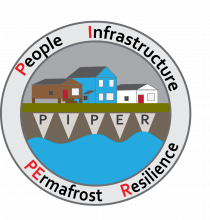Resilience and adaptation to the effects of permafrost degradation induced coastal erosion
Navigating the New Arctic (NNA) is one of NSF's 10 Big Ideas. NNA projects address convergence scientific challenges in the rapidly changing Arctic. The Arctic research is needed to inform the economy, security and resilience of the Nation, the larger region and the globe. NNA empowers new research partnerships from local to international scales, diversifies the next generation of Arctic researchers, and integrates the co-production of knowledge. This award fulfills part of that aim.
Temperatures in the Arctic are rising rapidly, and these warmer temperatures have caused permafrost, ground that remains frozen for at least two consecutive years, to warm and thaw. Permafrost coasts, which make up approximately 30% of the world's coastlines, are experiencing accelerated erosion due to thawing. Erosion at some locations has occurred at the rate of 16 m per year since 2007. Degradation of permafrost and related coastal erosion damages coastal infrastructure and facilities across the Arctic, impacting the economic prosperity and lives of its inhabitants. As critical infrastructure becomes vulnerable to permafrost degradation and erosion, residents are forced to abandon homes and entire communities must be relocated. This diverts resources from other critical needs and disrupts social networks and subsistence practices. This research addresses society's capacity to adapt by analyzing interactions among the natural environment, social systems, and the built environment, in a part of the Arctic where coastal erosion due to permafrost degradation is taking place. This project co-produces knowledge with Arctic indigenous communities and will share research outcomes to inform decision-making with local communities and the general public. The project promotes NSF's initiative of Inclusion across the Nation of Communities of Learners of Underrepresented Discoverers in Engineering and Science (INCLUDES) by involving local indigenous high school students in the collection of field data, providing workshops in local communities demonstrating how science and engineering can improve community well-being, and provides students and early-career researchers with training and capacity-building opportunities in convergent research.
The goal of this project is to understand the complex relationship between permafrost degradation and related coastal erosion, civil infrastructure, and community well-being, including social and cultural resilience. Results can be used to formulate a holistic and predictive model that aids adaptation of social systems and the built environment to the unprecedented environmental changes in the region. The project consists of five research tasks with related research products: (1) development of a thermal model with high spatial resolution (130 m) to evaluate and predict the rate, extent, and mechanisms of permafrost degradation in the next century and a maximum entropy principle model to estimate the future rate of coastal and river bluff erosion and thermokarst development; (2) creation of an infrastructure hazards map of the region experiencing the effects of permafrost degradation and coastal erosion; (3) co-production of knowledge with Arctic indigenous communities to identify and understand the most urgent issues relating to permafrost degradation and coastal erosion and flooding, as well as collecting and integrating local long-term observations of these phenomena by local observers; (4) development of a quantitative assessment model of sociodemographic resilience of communities to permafrost degradation, demonstrating the impacts of infrastructure disruptions on the social resilience and adaptation capacity of coastal communities; and (5) development of an agent-based model (ABM) that can be used to adapt civil infrastructure and build the social resilience of communities to future permafrost degradation and coastal erosion. The project works with communities along the coastal region of Alaska North Slope Borough (NSB) to develop and validate models, although results will be of value to many coastal communities experiencing permafrost-induced coastal erosion.
The goal of this collaborative research project between Xiao (1927718, LEAD, PSU), Romanovsky (1927708, UAF), Alessa (1927713, U of ID), and Zhang (1927715, MST) is to understand the complex interrelationships and mutual impacts of continued climate change in the Arctic. In 2020, the feldwork was cancelled due to travel restrictions related to COVID-19 and work was shifted by one year. From 2021-2025, researchers on this project will conduct data collection, model development, and validation on four towns in the coastal region of Alaska North Slope Borough — Nuiqsut, Utqiagvik, Wainwright, and Point Lay.
Resources
Resilience and Adaptation to the Effects of Permafrost Degradation Induced Coastal Erosion
A Navigating the New Arctic (NNA) project update video produced for the April 2020 virtual NNA Investigators meeting. The video is narrated by Dr. Ming Xiao (Pennsylvania State University).
Agents and the Arctic: The Case for Increased Use of Agent-Based Modeling to Study Permafrost
Permafrost thaw is one of the world’s most pressing climate problems, already disrupting lifestyles, livelihoods, economies, and ecosystems in the north, and threatening to spill beyond the boundaries of the Arctic as our planet continues to warm. To examine the effects of permafrost degradation, and increase our understanding of what this phenomenon means for the future of the region (and the world), The Arctic Institute’s new two-part permafrost series aims to analyze the topic from scientific, security, legal, and personal perspectives.
Infrastructure and Community Resilience in the Changing Arctic: Status, Challenges, and Research Needs
Permafrost thaw is one of the world’s most pressing climate problems, already disrupting lifestyles, livelihoods, economies, and ecosystems in the north, and threatening to spill beyond the boundaries of the Arctic as our planet continues to warm. To examine the effects of permafrost degradation, and increase our understanding of what this phenomenon means for the future of the region (and the world), The Arctic Institute’s new two-part permafrost series aims to analyze the topic from scientific, security, legal, and personal perspectives.
Publications
Liew, M., X. Ji, M. Xiao, L. Farquharson, D. Nicolsky, V. Romanovsky, M. Bray, X. Zhang, and C. McComb, 2022: Synthesis of physical processes of permafrost degradation and geophysical and geomechanical properties of permafrost, Cold Regions Science and Technology, 198, https://doi.org/10.1016/j.coldregions.2022.103522
Liew, M., M. Xiao, L. Farquharson, D. Nicolsky, A. Jensen, V. Romanovsky, J. Peirce, L. Alessa, C. McComb, X. Zhang, and B. Jones, 2022: Understanding Effects of Permafrost Degradation and Coastal Erosion on Civil Infrastructure in Arctic Coastal Villages: A Community Survey and Knowledge Co-Production, Journal of Marine Science and Engineering, 10(3), https://doi.org/10.3390/jmse10030422.
Schneider von Deimling, T., H. Lee, T. Ingeman-Nielsen, S. Westermann, V. Romanovsky, S. Lamoureux, D.A. Walker, S. Chadburn, E. Trochim, L. Cai, J. Nitzbon, S. Jacobi, and M. Langer, 2021: Consequences of permafrost degradation for Arctic infrastructure – bridging the model gap between regional and engineering scales, The Cryosphere, 15(5), https://doi.org/10.5194/tc-15-2451-2021
Wang, Z., M. Xiao, M. Bray, and M. Darrow, 2024: Experimental Investigation of Thermal and Hydraulic Properties of Ice-Rich Saline Permafrost in Northern Alaska, Cold Regions Engineering 2024: Sustainable and Resilient Engineering Solutions for Changing Cold Regions, https://doi.org/10.1061/9780784485460.026
Wang, Z., M. Xiao, M. Liew, A. Jensen, L. Farquharson, V. Romanovsky, D. Nicolsky, C. McComb, B.M. Jones, X. Zhang, and L. Alessa, 2023: Arctic geohazard mapping tools for civil infrastructure planning: A systematic review, Cold Regions Science and Technology, https://doi.org/10.1016/j.coldregions.2023.103969






